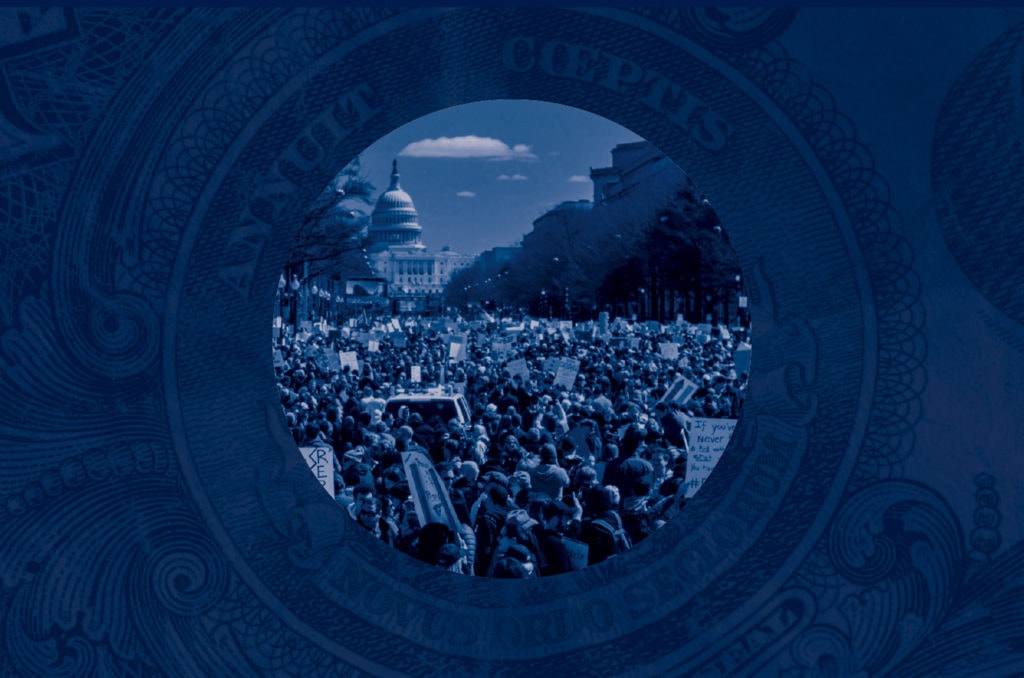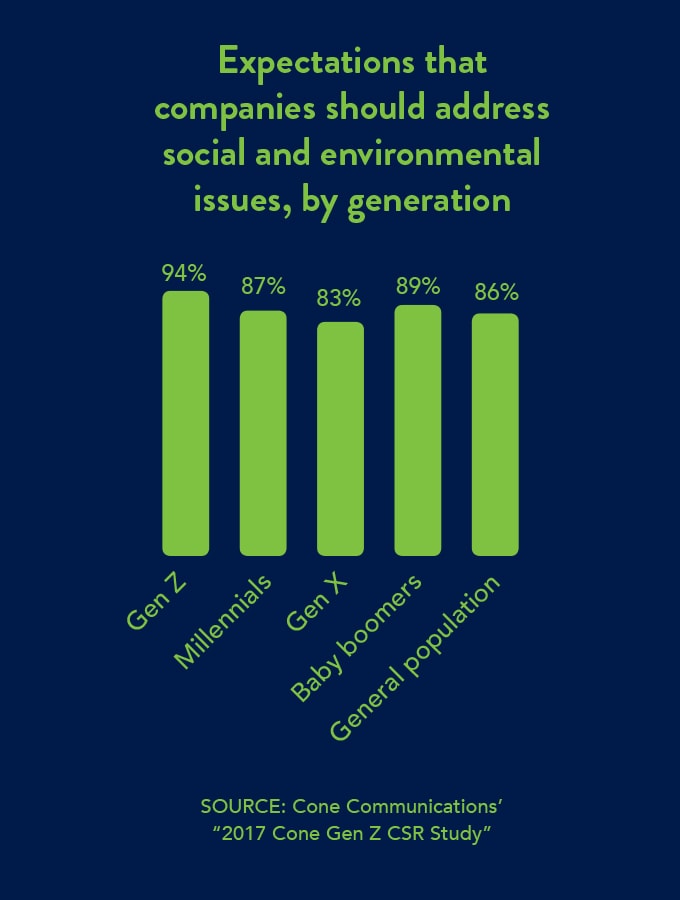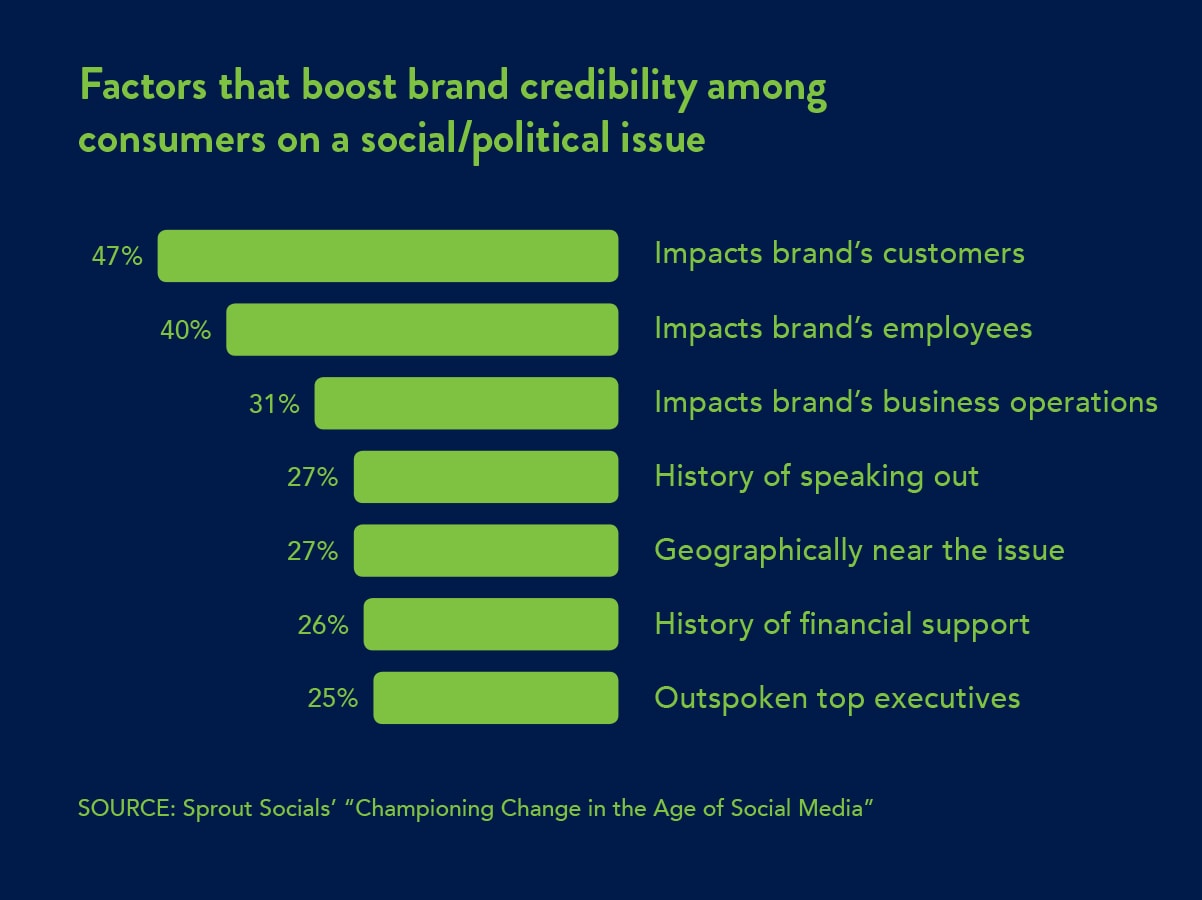
APEX Insight: Airlines may wince at the thought of taking a stand on a divisive issue, but they’re realizing that it doesn’t pay to keep quiet anymore either.
Among the numerous companies that severed ties with the National Rifle Association (NRA) in the wake of the Parkland, Florida, shooting that left 17 high school students dead on Valentine’s Day were United Airlines and Delta Air Lines – both of which took to Twitter to end contracts offering discounted rates to members of the gun lobby.
Reactions to the airlines’ decision were mixed, but for Delta, the move precipitated a retaliation by Georgia state leaders who said they’d prevent the airline from obtaining a lucrative $50-million tax exemption on jet fuel should it not reverse its decision. Finding itself in the crosshairs of a nationwide debate, Delta seemed to have two options: cede to the conservative backlash or take a firmer stance on gun control. It did neither.
FACE VALUE
According to research conducted by social media management firm Sprout Social, two-thirds of consumers deem it important for brands to take a public stand on leading social and political issues like immigration, human rights and race relations. Once capable of adopting a position of neutrality, businesses – of which airlines aren’t exempt – are thrust onto the public stage where social and business impact now converge.
“Airlines have now realized that if you try to be something to everyone, you end up being nothing to no one,” says Shashank Nigam, CEO of airline marketing strategy firm SimpliFlying and author of Soar: How the Best Airline Brands Delight Customers and Inspire Employees. “In order to build die-hard fans, you must be willing to alienate some people.” An example of an airline that has taken the plunge into political parlance – and profited tremendously – is Royal Jordanian (RJ), Nigam says, citing a series of social media ads that mock current events.
“If you try to be something to everyone, you end up being nothing to no one.” €” Shashank Nigam, SimpliFlying
The first of these ads, released hours before the results of the 2016 US elections were announced, showed ticket prices for RJ flights to Chicago, Detroit and New York, and the following cheeky line: “Just in case he wins… Travel to the US while you’re still allowed to!” That ad went viral, with an organic reach of 750 million across the airline’s social media channels, and bookings to the US increasing by 50 percent in December 2016, compared with the same period in 2015. The airline has since released snarky ads in response to President Donald Trump’s ban on electronic devices and United’s passenger-dragging controversy, as well as a video that depicts the experience of flying in an age of heightened Islamophobia, all suggesting that the national carrier may be in this for the long haul.
 Delta took a different approach. When faced with the prospect of forfeiting its tax break, the carrier’s response was: “Delta’s decision reflects the airline’s neutral status in the current national debate over gun control amid recent school shootings.” This posture of neutrality wasn’t enough for Georgia’s pro-gun activists and state leaders who subsequently nixed the proposed tax exemption, nor for certain gun-control activists who took to social media to criticize the airline for distancing itself from the issue. “Delta was caught flat-footed because it tried to take a political stand without actually going all in. That left them neither here nor there,” Nigam says. (The following month, the airline provided three round-trip charter flights to transport hundreds of students to participate in the “March for Our Lives” protest against gun violence in Washington, DC.)
Delta took a different approach. When faced with the prospect of forfeiting its tax break, the carrier’s response was: “Delta’s decision reflects the airline’s neutral status in the current national debate over gun control amid recent school shootings.” This posture of neutrality wasn’t enough for Georgia’s pro-gun activists and state leaders who subsequently nixed the proposed tax exemption, nor for certain gun-control activists who took to social media to criticize the airline for distancing itself from the issue. “Delta was caught flat-footed because it tried to take a political stand without actually going all in. That left them neither here nor there,” Nigam says. (The following month, the airline provided three round-trip charter flights to transport hundreds of students to participate in the “March for Our Lives” protest against gun violence in Washington, DC.)
THE KIDS KNOW
Phillip Haid, co-founder and CEO of social impact agency PUBLIC, agrees that staying on the frays of public discourse is no longer an option for airlines. “When you think about the blurring lines between citizen and consumer, Generation Z – and also millennials but to a lesser extent – are very comfortable with companies being real social-change agents,” he says. “They have no issue with that. In fact, they expect it. Nonprofits don’t have the monopoly on doing good anymore.”
“Nonprofits don’t have the monopoly on doing good anymore.” €” Phillip Haid, PUBLIC
And with Gen Z – those born in the mid-1990s to late 2000s – now making up the largest subset of the US population, at 26 percent, and holding an estimated $44 billion in purchasing power, airlines that fail to lay their stake in the sociopolitical landscape risk missing out. “When I look at the airline industry,” Haid says, “I don’t see a lot of thinking about social purpose and impact as a business driver. Airlines are still viewing it, for the most part, as a charitable activity. It always comes very late in the process; it just feels like a nice little add-on, and that’s a huge missed opportunity.”
These “add-ons” – be they donations or one-off corporate social responsibility (CSR) initiatives – may be scrutinized by consumers, of which 89 percent would rather buy from a company supporting social and environmental issues over one that does not, according to a 2017 survey by Cone Communications. “Because of technology, the speed and transparency of information is unprecedented. Before, you could do some bad things with your business on one side and do some good things on the other side and try to balance it out. You can’t do that anymore,” Haid says. Even those companies doing some really amazing things for the environment or the community will be met by the skepticism of young consumers asking, “But what about your supply chain?” he adds.
SOCIAL DISCOURSE
Before jumping in on a trending issue on social media or aligning with a charitable cause, airlines need to take a hard look at where their business is going, what their brand essence is and what their consumers and employees value, Haid says. “Look at all of those things and you’ll see the issue that makes the most sense for your business to really lean into. You can’t engage the consumer in social impact marketing if you aren’t walking the walk yourself.”
Turning inward is precisely what Icema Gibbs, JetBlue’s director of CSR, says the airline did before embracing its socially driven brand identity. “One of the things we do is talk to our customers and crewmembers to see what they are passionate about. We really try to take the time to research and investigate and have town hall meetings – whatever it takes to make sure we are working from a position of authenticity,” Gibbs says.

For JetBlue, that position is firmly rooted in the local arena: Through JetBlue for Good, selected low-income neighborhoods across the US are benefiting from vending machines dispensing some 100,000 free children’s books per year, playgrounds built in partnership with KaBOOM! and aviation-related learning opportunities. Food businesses in New York, the carrier’s home state, can apply for the carrier’s business mentorship program, which helps small local companies break into the aviation catering space.
Japan Airlines (JAL) is similarly pursuing local campaigns, prompted by questions like “How will the world be different should JAL cease to exist tomorrow?” and “Are we merely selling what we produce or truly producing what we sell?” says Akira Mitsumasu, the airline’s vice-president of Product and Services Planning. In April, the airline launched JAL Pet Family, which allows members of the airline’s mileage program to register up to five cats or dogs as members (each pet receiving its own photo ID) so that they can earn perks from pet hotels, shops and hospitals. The initiative, Mitsumasu says, addresses a serious local concern: “the reality that there are more pets than children in Japan.”
POLITICS PAY
Social realities may be safer ground from which airlines can build their brand, but when it comes to building awareness and increasing customer recruitment, taking a political stance will yield quicker results, SimpliFlying’s Nigam says. However, it must be obvious to consumers why and how an airline has the license to operate on a given issue, making matters associated with local governance a sounder bet, he says, pointing to Virgin Atlantic as an example of an airline that’s succeeding in this regard, and doing so “in a way that blends right in with their tongue-and-cheek image.”
In May 2017, one week after UK Prime Minister Theresa May triggered Article 50 (in the European Union’s Lisbon Treaty), Virgin released a 60-second spot entitled “The Bright Side of Brexit,” informing viewers how the country’s financial ruin could be a boon to travelers. The campaign, devised by Figliulo&Partners, also included a “Brexit Calculator” showing travelers just how much they could save during a trip to London thanks to the pound’s tumble. Return on investment for this campaign was 2:1.
“Business and purpose definitely align, and they intersect at so many different points.” €” Icema Gibbs, JetBlue
Part of why these political marketing campaigns and purpose-driven business models are seeing so much success is that brands are allowing consumers to vote with their wallet at a time when they believes their institutions are failing them. Indeed, according to Edelman’s “2017 Earned Brand” study, 51 percent of consumers believe brands can do more to solve social ills than the government itself.
But it isn’t just about how brands can impact social and political causes, but how involvement with these same issues can in turn generate high returns for airlines. “Business and purpose definitely align, and they intersect at so many different points,” JetBlue’s Gibbs says. “Our programs benefit areas in need, as well as those who are fortunate enough to fly with us, but they also benefit us. It makes people realize that we really do care, and when they book that next flight, that might be how they spend their dollar.”
“On Purpose and Profit” was originally published in the 8.3 June/July issue of APEX Experience magazine.


